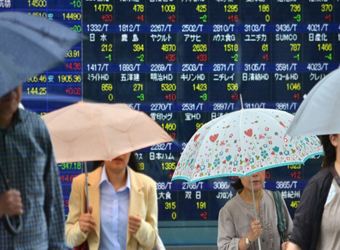Those measures, which Xi brought up in his speech at the Boao Forum for Asia, included lowering import tariffs for autos and other products, as well as enforcing legal intellectual property of foreign firms.
Stocks in the region climbed and the dollar strengthened against the yen on the back of those remarks. U.S. stock futures also edged up amid improved investor confidence.
In Japan, the Nikkei 225 advanced 1.08 percent after beginning the day in negative territory. South Korea’s Kospi index, meanwhile, erased earlier losses to edge up by 0.25 percent.
Elsewhere, China markets traded mostly higher. Hong Kong’s Hang Seng Index rose 0.9 percent after its tentative open this morning. On the mainland, the Shanghai composite tacked on 0.48 percent and the Shenzhen composite was off by 0.05 percent.
Down Under, the S&P/ASX 200 rose 0.7 percent.
Dow Jones industrial average futures were higher by 286 points in late Asia morning trade.
“The market is reacting positively to the speech and many points [Xi] highlighted in the speech were actually well anticipated by many of the domestic observers here in China,” Hao Hong, chief strategist at Bank of Communications International, told CNBC’s “Street Signs.” He pointed to better market access and the lifting of foreign ownership caps as examples of those measures.
Markets in the region had traded mixed ahead of Xi’s speech, which had been anticipated amid heightened U.S.-China trade tensions in recent weeks.
Investors had been on edge over the possibility of a trade war happening, although those concerns eased slightly in the last session.
Against the yen, the dollar firmed to trade at 107.15 by 10:35 a.m. HK/SIN, compared to levels around the 106.9 handle seen before Xi’s speech. Meanwhile, the dollar index firmed to trade at 89.920.
Xi’s speech on Tuesday came on the back of President Donald Trump’s announcement on Friday that he had instructed U.S. trade officials to consider an additional $100 billion in tariffs on Chinese imports.
That followed China’s Wednesday announcement that it would introduce extra tariffs on 106 U.S. products, including soybeans, although no start date was given.
Trump said in a tweet on Sunday that he expected China would remove its trade barriers, adding that the U.S. and China had a “[g]reat future” ahead. On Monday, however, the president criticized China in a separate tweet for what he called “STUPID TRADE.”
U.S. stock indexes rose on Monday, but finished the day well off session highs following a report that FBI officers had raided the office of Michael Cohen, Trump’s longtime personal lawyer. Stocks had rallied earlier in the session after recent U.S.-China trade tensions appeared to ease following a week largely dominated by trade-related developments.
Source: CNBC
